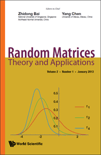
Random Matrices-Theory and Applications
Scope & Guideline
Pioneering Research in Random Matrices and Beyond
Introduction
Aims and Scopes
- Theoretical Developments in Random Matrix Theory:
The journal publishes research that delves into the mathematical foundations and theoretical aspects of random matrices, including eigenvalue distributions, spectral theory, and asymptotic behavior. - Applications in Statistics and Data Science:
Research involving the application of random matrix theory in statistics, particularly in the analysis of high-dimensional data, covariance matrices, and statistical inference. - Connections to Quantum Mechanics and Physics:
Papers that explore the links between random matrix theory and physics, especially in quantum mechanics and statistical mechanics, reflecting the theory's relevance in understanding complex systems. - Free Probability and Noncommutative Geometry:
The journal includes works pertaining to free probability theory and noncommutative geometry, which are essential in understanding the behavior of large random matrices. - Interdisciplinary Applications:
Research that applies random matrix theory to various fields such as finance, telecommunications, and machine learning, illustrating its versatility and real-world relevance.
Trending and Emerging
- High-Dimensional Statistics:
There is a growing emphasis on high-dimensional statistical problems, particularly in the context of machine learning and data analysis, where random matrices are used to understand the behavior of large datasets. - Non-Hermitian and Complex Matrix Models:
Research on non-Hermitian matrices and complex matrix models is increasingly prominent, reflecting the need to understand systems that do not conform to traditional assumptions of symmetry. - Applications in Machine Learning and Neural Networks:
The intersection of random matrix theory with machine learning, particularly in understanding deep neural networks and their properties, is emerging as a vital area of research. - Free Probability and Quantum Information:
The application of free probability in quantum information theory is gaining attention, highlighting the relevance of random matrices in understanding quantum systems and entanglement. - Dynamic and Time-Varying Models:
There is an increase in studies focusing on dynamic and time-varying models, particularly in the context of stochastic processes and their applications in finance and signal processing.
Declining or Waning
- Classical Random Matrix Ensembles:
While foundational results on classical ensembles like Gaussian and Wishart matrices remain important, there is a noted decline in new contributions focusing solely on these classical models as researchers explore more complex and generalized frameworks. - Basic Statistical Applications:
The focus on straightforward statistical applications of random matrices, such as basic hypothesis testing and estimation techniques, has waned as the field moves toward more complex, high-dimensional problems. - Simplistic Eigenvalue Analysis:
Research dedicated to simplistic eigenvalue analysis without considering the interplay of more complex structures (e.g., tensor products or non-Hermitian cases) is less frequently observed in recent publications.
Similar Journals
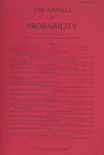
ANNALS OF PROBABILITY
Shaping the Future of Statistical UnderstandingANNALS OF PROBABILITY, published by the Institute of Mathematical Statistics (IMS), is a premier academic journal dedicated to the field of probability theory and its applications. With an impressive impact factor and ranked within the top quartile (Q1) in both Statistics and Probability and Statistics, Probability and Uncertainty categories as of 2023, this journal serves as a vital platform for researchers and practitioners in the field. The journal has a significant convergence period from 1996 to 2024, reflecting its enduring contribution to the scientific dialogue surrounding probabilistic methods and theory. The journal garners a high standing in Scopus rankings, holding a remarkable 35th position out of 278 in Mathematics and boasting an 87th percentile ranking, underscoring its influence and reach. While it does not provide Open Access options, its rigorous peer-review process ensures the publication of high-quality research that advances the understanding and application of probability across various disciplines. Researchers, professionals, and students alike will find the ANNALS OF PROBABILITY instrumental in their academic pursuits and professional development in the evolving landscape of probability and statistics.

Forum of Mathematics Pi
Unveiling Insights in Algebra and BeyondForum of Mathematics Pi, published by Cambridge University Press, stands at the forefront of mathematical research, providing an open-access platform since 2013. With an ISSN of 2050-5086, this journal has rapidly established itself within the mathematical community, particularly noted for its high impact in the realms of Algebra and Number Theory, Analysis, Discrete Mathematics and Combinatorics, Geometry and Topology, Mathematical Physics, and Statistics and Probability, as evidenced by its 2023 Q1 rankings across these categories. Its placement within the top quartile signifies its importance and influence, attracting submissions from leading researchers and academicians around the globe. The journal’s diverse scope and rigorous peer-review process ensure a high standard of scholarly excellence, making it an indispensable resource for professionals, students, and researchers eager to stay informed about cutting-edge mathematical advancements. Access to its comprehensive array of articles is openly available, promoting a culture of collaboration and knowledge sharing in the mathematics community.

Journal of the Indian Society for Probability and Statistics
Advancing the Frontiers of Statistical KnowledgeJournal of the Indian Society for Probability and Statistics, published by SpringerNature in Germany, is a prominent platform dedicated to advancing the field of statistics and probability. With its E-ISSN of 2364-9569, the journal features rigorous research articles, reviews, and theoretical advancements aimed at promoting the application of statistical methodologies in diverse areas. As part of the academic community since 2016, it has maintained a commendable Q3 ranking in the Statistics and Probability category for 2023, indicating its growing influence and relevance. As the journal aims to foster collaborations among statisticians and probabilists, it serves as an invaluable resource for researchers, professionals, and students looking to deepen their understanding and share innovative ideas. While the journal operates under a subscription model, its commitment to open access publication contributes to the broader dissemination of knowledge in this vital field, further enhancing its importance and utility within the scientific landscape.

PROBABILITY THEORY AND RELATED FIELDS
Pioneering Insights in Probability Theory and ApplicationsPROBABILITY THEORY AND RELATED FIELDS is a premier journal published by SPRINGER HEIDELBERG, dedicated to advancing the field of probability and its applications. With an ISSN of 0178-8051 and an E-ISSN of 1432-2064, this journal has established itself as a leading platform for innovative research, featuring significant contributions to the theories and methodologies in probability, statistics, and uncertainty analysis. Its impressive ranking in the 2023 category quartiles places it in the Q1 tier within Analysis, Statistics and Probability, highlighting its importance in the academic community. The journal is widely recognized for its rigorous peer-review process, ensuring high-quality publications that cater to researchers, professionals, and students alike. Located in Germany at TIERGARTENSTRASSE 17, D-69121 HEIDELBERG, it continues to shape the future of statistical sciences from 1986 until 2024 and beyond. Researchers in the field are encouraged to contribute their findings, ensuring the journal remains at the forefront of innovative statistical research.
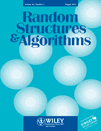
RANDOM STRUCTURES & ALGORITHMS
Charting New Territories in Applied Mathematics and GraphicsRANDOM STRUCTURES & ALGORITHMS is a prestigious journal published by Wiley that stands at the forefront of research in the realms of applied mathematics, computer graphics, and algorithms. With a notable Impact Factor, it has consistently maintained a Q1 ranking across several categories including Applied Mathematics and Software, showcasing its significant contribution to these fields. The journal, which has been in circulation since 1990, serves as a vital resource for researchers, professionals, and students keen on exploring the complex interplay between randomness and computational efficiency. Although it operates under a traditional access model, the quality and relevance of the content ensure it attracts a broad readership eager to engage with cutting-edge studies and innovative solutions. For those looking to stay at the cutting edge of developments in random structures and algorithms, RANDOM STRUCTURES & ALGORITHMS is an essential journal that continues to shape the landscape of contemporary research.
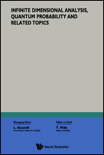
INFINITE DIMENSIONAL ANALYSIS QUANTUM PROBABILITY AND RELATED TOPICS
Bridging Theory and Application in MathematicsINFINITE DIMENSIONAL ANALYSIS QUANTUM PROBABILITY AND RELATED TOPICS, published by WORLD SCIENTIFIC PUBL CO PTE LTD, is a key academic journal dedicated to the exploration of advanced themes in applied mathematics, mathematical physics, and quantum probability. Since its inception in 1998, the journal has established itself as a critical resource for researchers and professionals in these interdisciplinary fields, currently standing in the third quartile according to the 2023 category rankings. Scholars can access a wealth of rigorous articles that delve into infinite dimensional analysis, providing valuable insights pertinent to statistical and nonlinear physics, and offering a platform for pioneering research. This journal not only bridges theoretical frameworks and practical applications but also nurtures a collaborative environment for emerging and established scholars. Through its commitment to advancing knowledge, INFINITE DIMENSIONAL ANALYSIS QUANTUM PROBABILITY AND RELATED TOPICS serves as an indispensable tool for anyone engaged in the forefront of quantum probability research.

Theory of Probability and Mathematical Statistics
Exploring the Depths of Statistical TheoryTheory of Probability and Mathematical Statistics, published by the Tarás Shevchenko National University of Kyiv, Faculty of Mechanics and Mathematics, serves as a vital resource for academics and practitioners in the field of statistics and probability. With an ISSN of 0094-9000 and E-ISSN 1547-7363, this journal aims to advance theoretical insights and practical applications related to probability theory and statistical methods. Operating from the heart of Ukraine, this journal has been influential since its inception in 2004 and continues to contribute to the academic community as it converges through a significant period until 2024. Despite currently not offering Open Access options, it maintains a respectable Q3 classification in both Statistics and Probability, highlighting its stability within the scholarly landscape. The journal's Scopus rankings further emphasize its specialization, ranking #121 in Statistics, Probability, and Uncertainty, and #203 in Mathematics, underscoring its importance for researchers, students, and professionals seeking to enrich their understanding and foster innovation in these disciplines.
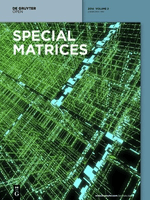
Special Matrices
Bridging Mathematical Domains for Collaborative GrowthSpecial Matrices is an esteemed open-access journal published by DE GRUYTER POLAND SP Z O O, focusing on the advancement of research in the fields of algebra, number theory, geometry, and topology. Since its inception in 2013, the journal has carved out a niche for itself, earning its place in the Q3 category for both Algebra and Number Theory as well as Geometry and Topology in the 2023 rankings. With a commitment to fostering scholarly work that bridges various mathematical domains, Special Matrices serves as a platform for researchers and professionals to disseminate their findings and share innovative ideas. With this journal's open-access model, all published research is freely available, promoting broader accessibility and collaboration within the mathematical community. Whether you are a researcher, a student, or a professional looking to stay updated on contemporary issues and trends, Special Matrices is a valuable resource that supports the continuous dialogue and exploration in the realms of mathematical sciences.
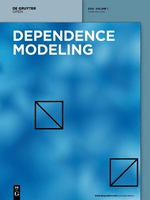
Dependence Modeling
Exploring the Complexities of Random DependenciesDependence Modeling is an innovative academic journal published by DE GRUYTER POLAND SP Z O O that focuses on the intricacies of dependence among random variables within the fields of Applied Mathematics, Modeling and Simulation, and Statistics and Probability. Since its inception in 2013, this Open Access journal has provided a platform for the dissemination of cutting-edge research, fostering collaboration and engagement among researchers, professionals, and students alike. With a commitment to high-quality scholarship, Dependence Modeling has made an impact within the academic community, as evidenced by its quartile rankings in 2023 and its presence in essential databases such as Scopus. The journal's unique scope emphasizes the importance of innovative methodologies and models that enhance our understanding of complex dependencies, making it an essential resource for those dedicated to advancing knowledge in these critical areas of study. With its physical base in Warsaw, Poland, the journal continues to make strides in global research dissemination through its accessible format.
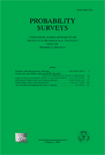
Probability Surveys
Elevating Research Standards in Statistics and Probability.Probability Surveys is a premier open-access journal dedicated to the advancement of knowledge in the fields of Statistics and Probability. Published by PROBABILITY SURVEYS, this esteemed platform has been curating high-quality surveys and reviews since its inception in 2004. With an impressive impact factor and recognition as a Q1 journal in its category, it ranks an admirable #32 out of 278 in its Scopus category, placing it in the 88th percentile among its peers. As a scholar-focused resource, it strives to bridge the gap between mathematical theory and practical application, providing insights valuable to researchers, academicians, and industry professionals alike. Located in the United States with contributions from esteemed names in the field, Probability Surveys supports enhanced accessibility to important research through its open-access model, ensuring that cutting-edge findings are available to a broad audience. Whether you are a seasoned researcher or a student embarking on your journey in statistical disciplines, this journal serves as an indispensable reference point on the state-of-the-art developments in probability.